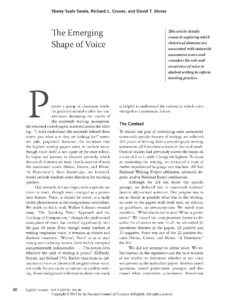Author: Sherry Swain, Richard L. Graves, and David Morse
Summary: This article details research about rhetorical elements associated with statewide assessment scores, and it focuses on teacher-noted occurrences of voice in student writing. The authors also spotlight student writing excerpts that are demonstrative of voice, concluding that voice is hard to define and has a metaphoric quality, possibly that of “soul.” Because voice is often assessed in student writing (i.e., the 6 + 1 Traits of Writing), teachers often seek to find concrete ways to find voice or to model it. This resource can be helpful for teacher inquiry groups as a guide to finding examples of voice through an action research project. Any school or district-level inquiry team could use this research to support curriculum development or to help understand that voice grows through the composing process.
Original Date of Publication: May 2015
Excerpt
“Voice grows out of the rich soil of student writing, not from drills or lectures or admonitions, not from workbooks or textbooks. Voice emerges in the course of the composing process, a by-product of the writer’s focus on content, purpose, diction, style, and audience. The key word is emerge. The creation of voice is not an end in itself but a by-product growing out of the process of writing. Preoccupation with voice shifts the point of view from ‘you’ to ‘I,’ from focus on audience to focus on self. Rhetorical features themselves are not voice. Voice is observed indirectly or intuitively through the rhetorical features. Since voice is observed indirectly, it follows then that the major teaching of voice should also be indirect.
Definitions of voice, plentiful as they are, do not give us clues about how to teach it. In the past, we’ve heard ourselves say, ‘Write like you talk’; or ‘Let the reader hear your voice.’ But now Common Core State Standards (CCSS) demand that students ‘establish and maintain formal style’ for informational and argumentative writing and ‘style appropriate to task, purpose, and audience’ for narrative writing (44–45). Now we are more concerned with audience than with the writer taking ‘a risk by the inclusion of personal details that reveal the person behind the words’ (NWREL). In other words, classroom teachers need more ways to teach voice than merely admonishing students to use their oral language.”
Related Resources
- When Students Take a Critical Lens to Traditional Literature: Protest and Student Voice
- Formative Assessment as a Compass: Looking at Student Work as an Intentional Part of Ongoing Professional Development
- Voces del Corazón: Voices from the Heart
Original Source: National Writing Project, http://www.nwp.org/cs/public/print/resource/4440
